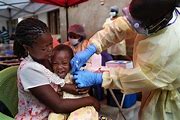How does a tiny needle bring immense relief to those battling one of the deadliest viruses known to humankind? Let’s delve into the remarkable story of preventive Ebola vaccination and how it is safeguarding the heroes on the frontlines of healthcare in the Democratic Republic of the Congo.
Meet Chrysostome Kavusa Mwenderwa, a 42-year-old health care worker at Kalunguta Referral Hospital in Beni. With a sense of gratitude in his voice, he shares,
““Getting the Ebola vaccine has given me a deep sense of security and will allow me to concentrate fully on my work.””
Kavusa is just one among 18,748 frontline and health care workers who received this crucial shield against Ebola between June and September 2023. This initiative was part of a concerted effort by the World Health Organization (WHO) to bolster epidemic preparedness and save lives in North Kivu province, DR Congo. As reported by [www.africahealthtimes.com], these vaccinations are pivotal for those constantly facing the threat of infectious diseases like Ebola.
Dr. Boureima Hama Sambo, WHO Representative in DR Congo, emphasizes that
““Health care workers are responsible for preventing disease, responding to outbreaks, and mitigating risk in communities.”
Their dedication comes with an inherent vulnerability due to exposure risks. Hence, preventive measures like vaccination play a critical role in ensuring their safety.
Moreover, beyond individual protection, these vaccinations contribute significantly to strengthening health systems as Dr. Sambo explains,
” “Ebola vaccination also helps strengthen health systems…”
This not only enhances overall public health but also lays down foundations for broader adult vaccination programs.
Dr. Nanou Yanga Mukadi sheds light on the comprehensive approach adopted towards vaccinating frontline workers:
”
“
We have leveraged professional associations…to encourage prophylactic vaccination for frontline and health care workers.”
This multi-pronged strategy involves grassroots planning supported by various stakeholders including WHO and educational institutions.
In discussing why such initiatives are essential, Dr. Mukadi underscores,
“Ebola is transmitted through contact with an infected patient’s blood or bodily fluids…”
The nature of healthcare work exposes professionals to these risks daily; thus, proactive steps like vaccinations are paramount.
The impact of these preventive measures goes beyond individual well-being. Remacle Kasereka Kitutu echoes this sentiment,
“The importance of getting vaccinated cannot be overemphasized.”
For healthcare workers like him, being vaccinated means not only personal safety but also uninterrupted service provision while upholding stringent infection control practices.
As countries like Guinea-Bissau and Uganda join DR Congo in these efforts,
“WHO urges other countries at high risk to also consider preventive Ebola vaccination,”
> emphasizing the urgency of proactive measures against this deadly virus.
>
It’s clear that these vaccines are more than just shots; they represent hope,
“In 2023,…the ERVEBO® vaccine…available…to ramp up country preparedness for future outbreaks”
. The global community’s collaborative efforts aim not only at containing current threats but also at fortifying defenses against potential future crises.
In conclusion,The commitment shown towards safeguarding our healthcare heroes reflects a profound recognition…. Their dedication amidst challenging circumstances deserves unwavering support – support that begins with something as simple yet powerful as a vaccine.
Attribution:
Original article retrieved from [www.africahealthtimes.com].

